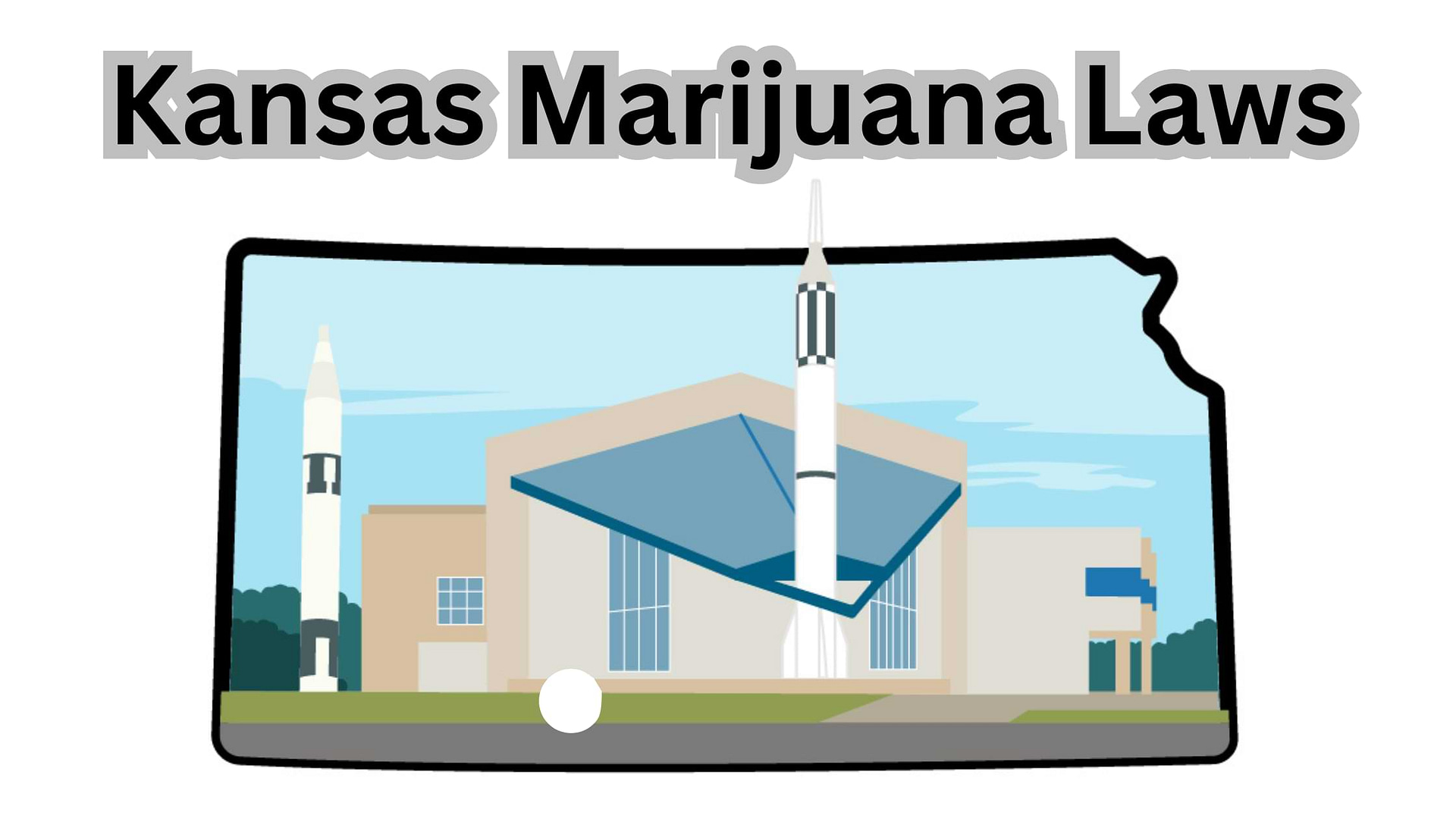Kansas, known for its scenic beauty and diverse culture, has rules about marijuana that might puzzle you. Here's the scoop: Possessing marijuana in Kansas is a misdemeanor. That's a big word for a small crime. If you get caught, it could mean up to six months in jail and a fine of up to $1,000 for your first time. A second offense? It's still a misdemeanor.
In this guide, we'll break it down step by step. Whether you're from here or just visiting, understanding Kansas marijuana laws is important. So, let's make it simple and clear as we explore the ins and outs of these laws.
Table of Contents
- 1 Historical Perspective
- 2 Current Legal Status
- 3 Possession and Cultivation
- 4 Medical Marijuana Laws of Kansas
- 5 Decriminalization vs. Legalization
- 6 Driving Under the Influence
- 7 Local Regulations
- 8 Impact on Communities
- 9 Advocacy and Activism
- 10 Challenges and Controversies Of Laws in Kansas
- 11 Future Trends and Possibilities
- 12 Conclusion
- 13 Frequently Asked Questions (FAQs)
- 14 Is marijuana legal in Kansas?
- 15 Can I possess a small amount of marijuana in Kansas without facing legal consequences?
- 16 Are there any exceptions for medical marijuana patients in Kansas?
- 17 What are the penalties for marijuana possession in Kansas?
- 18 Are there any efforts to change Kansas' marijuana laws?
- 19 Can local governments in Kansas set their own marijuana regulations?
- 20 How do marijuana laws in Kansas compare to neighboring states?
- 21 What is the stance of law enforcement agencies in Kansas on marijuana enforcement?
- 22 Are there any support groups or organizations advocating for marijuana legalization in Kansas?
- 23 What can I do to stay informed about changes in Kansas marijuana laws?
Historical Perspective

Kansas Marijuana Laws: A Journey Through Time
The history of Kansas marijuana laws dates back many decades. In the early 20th century, like most states, Kansas prohibited the use of marijuana. Over time, these laws have undergone significant changes.
Kansas' stance on marijuana mirrored the federal government's position for much of its history. The Marihuana Tax Act of 1937 effectively banned marijuana at the federal level, and Kansas, like many other states, followed suit. This marked the beginning of a long era of marijuana prohibition in the state.
Current Legal Status
In Kansas, marijuana is illegal for both recreational and medical use. The possession, sale, and cultivation of marijuana are strictly regulated and subject to severe penalties.
As of the last update in September 2021, the possession of any amount of marijuana for personal use is considered a criminal offense in Kansas. The penalties for possession can range from fines to probation and even imprisonment, depending on the amount and circumstances. It's essential to understand the legal consequences of marijuana-related activities in the state to avoid running afoul of the law.
Possession and Cultivation
Possession limits in Kansas are rigidly enforced. Understanding these limits is crucial to avoiding legal trouble. As of my last update, there was no specific threshold for possession defined in the law. Instead, possession is generally treated as a misdemeanor or felony depending on the amount and intent, with more substantial penalties for larger quantities and potential intent to distribute.
Cultivation of marijuana, whether for personal use or sale, is illegal in Kansas. If you are caught growing marijuana without the proper licenses, you can expect significant legal consequences, including substantial fines and imprisonment.
Medical Marijuana Laws of Kansas
While Kansas has not yet legalized medical marijuana, there have been ongoing discussions and legislative efforts to establish a medical marijuana program. It's worth noting that the situation regarding medical marijuana have evolved since my last update, and I recommend checking the most recent sources for any changes in this regard.
Proponents of medical marijuana argue that it can provide relief to individuals suffering from various medical conditions. However, the debate around medical marijuana in Kansas has been polarized, with concerns about potential misuse and the need for strict regulations.
Also check the New Jersey Marijuana Laws.
Decriminalization vs. Legalization

We will delve into the ongoing debate about decriminalization and legalization of marijuana in Kansas, discussing the potential benefits and drawbacks of both approaches.
In the realm of marijuana policy, two key approaches often emerge: decriminalization and legalization. Let's explore the key differences between these two strategies.
| Aspect | Decriminalization | Legalization |
| Possession | Reduced to a civil infraction, similar to a traffic ticket. | Legal for adults to possess limited quantities. |
| Cultivation | Generally remains illegal. | May be legal for personal use or regulated for sale. |
| Sale and Distribution | Remains illegal except for licensed dispensaries (if applicable). | Licensed sales allowed, regulated, and taxed. |
| Criminal Records | Reduced likelihood of criminal record for simple possession. | No criminal record for legal possession and use. |
| Law Enforcement | Reduced law enforcement resources allocated to marijuana-related cases. | May require law enforcement oversight for regulation. |
| Tax Revenue | Limited tax revenue generation. | Potential for substantial tax revenue generation. |
| Economic Impact | Minimal economic benefits beyond reduced enforcement costs. | Potential for job creation and economic growth. |
| Product Safety | Unregulated market, potential for unsafe products. | Strict regulations ensure product safety and quality. |
| Social Equity | May address issues of racial disparities in drug arrests. | May include provisions for social equity and justice. |
| Legal Age | May set a minimum legal age for possession. | Sets a minimum legal age for purchase and use. |
Driving Under the Influence
Driving under the influence of marijuana is illegal in Kansas and can result in serious consequences. Kansas has a “per se” law, which means that if you are found to have any detectable amount of THC (the psychoactive compound in marijuana) in your system while driving, you can be charged with DUI (Driving Under the Influence).
The penalties for a marijuana-related DUI can include fines, license suspension, mandatory drug education programs, and even imprisonment, especially if the offense results in accidents or injuries. To stay on the right side of the law and ensure road safety, it's crucial to avoid driving while impaired by marijuana.
Local Regulations
The Role of Local Governments
Kansas allows local governments to have some control over marijuana regulations within their jurisdictions. This means that laws vary from city to city and county to county. Before engaging in any marijuana-related activities, it's essential to research and understand the specific regulations in your area.
Some local governments choose to enact stricter regulations than those imposed at the state level, while others adopt a more permissive stance. This patchwork of local regulations can create challenges for individuals trying to navigate the complex legal landscape of marijuana in Kansas.
Impact on Communities
We'll examine how marijuana laws affect Kansas communities, from their social fabric to the economic landscape. Real-life examples will shed light on these impacts.
Social Impact: The criminalization of marijuana can have a significant impact on individuals and communities. Arrests and convictions for marijuana-related offenses can lead to long-lasting consequences, including difficulties in finding employment and housing. This disproportionately affects marginalized communities.
Economic Impact: The illegal status of marijuana means that the state misses out on potential tax revenue and economic opportunities. In states that have legalized marijuana, the cannabis industry has created jobs and generated substantial tax revenue.
Public Safety: Law enforcement agencies are tasked with enforcing marijuana laws, diverting resources from addressing more pressing issues. Moreover, the illegal market for marijuana can lead to unsafe and unregulated products.
Advocacy and Activism
Several advocacy groups and organizations are working towards changing Kansas' marijuana laws. Discover how they influence public opinion and policy.
Kansans for Hemp: This advocacy group focuses on promoting the industrial hemp industry in Kansas. While industrial hemp is distinct from marijuana, its advocacy can pave the way for broader conversations about cannabis regulation.
Kansas NORML (National Organization for the Reform of Marijuana Laws): This chapter of the national organization advocates for the reform of marijuana laws in Kansas. They work to raise awareness about the benefits of legalization and push for policy changes.
Challenges and Controversies Of Laws in Kansas
From law enforcement challenges to the controversial aspects of marijuana legislation, we'll explore the hurdles faced in reforming Kansas marijuana laws.
Law Enforcement Challenges: Enforcing marijuana laws can be resource-intensive for law enforcement agencies. The gray area between state and federal laws creates additional challenges in determining how to handle marijuana-related cases.
Medical Marijuana Debate: The debate over medical marijuana has been a contentious issue in Kansas. While some argue that medical marijuana can provide relief to patients with debilitating conditions, others express concerns about potential misuse and the need for strict regulations.
Federal vs. State Conflict: Marijuana remains illegal at the federal level, creating a conflict between state and federal laws in states that have legalized it. This conflict can have consequences for businesses, patients, and individuals involved in the marijuana industry.
Future Trends and Possibilities

What does the future hold for Kansas marijuana laws? We'll make some predictions and discuss potential changes and reforms on the horizon.
Changing Public Opinion: As attitudes toward marijuana evolve across the country, public opinion in Kansas shift in favor of reforming marijuana laws. Surveys have
indicated growing support for medical marijuana and, to some extent, even recreational legalization.
Legislative Efforts: Kansas lawmakers have introduced bills related to marijuana reform in recent years. While significant changes have not been enacted at the time of my last update, the legislative landscape can evolve.
Bordering States: The legalization of marijuana in neighboring states like Colorado and Oklahoma can influence the conversation in Kansas. Residents of bordering states travel to access legal marijuana, potentially putting pressure on Kansas to reconsider its laws.
Conclusion
Understanding Kansas marijuana laws is essential for anyone living in or visiting the state. While the legal landscape be challenging, ongoing efforts and discussions suggest that change be on the horizon. Stay informed, follow the rules, and advocate for change if you believe it's necessary.
As of my last update in September 2021, the information provided here is accurate. However, the situation regarding marijuana laws can change over time, so it's crucial to consult the most recent sources and legal updates to stay fully informed about the status of marijuana in Kansas.
Frequently Asked Questions (FAQs)
Is marijuana legal in Kansas?
No, marijuana is illegal for both recreational and medical use in Kansas.
Can I possess a small amount of marijuana in Kansas without facing legal consequences?
No, possession of any amount of marijuana is illegal in Kansas.
Are there any exceptions for medical marijuana patients in Kansas?
Kansas does not have a medical marijuana program at the moment.
What are the penalties for marijuana possession in Kansas?
Penalties can include fines, probation, and even imprisonment, depending on the amount and circumstances.
Are there any efforts to change Kansas' marijuana laws?
Yes, there have been ongoing efforts and discussions to change marijuana laws in Kansas, but significant changes have not been enacted yet.
Can local governments in Kansas set their own marijuana regulations?
Yes, local governments in Kansas can have some control over marijuana regulations within their jurisdictions.
How do marijuana laws in Kansas compare to neighboring states?
Marijuana laws vary significantly from state to state. It's important to be aware of the laws in each state you visit.
What is the stance of law enforcement agencies in Kansas on marijuana enforcement?
Law enforcement agencies in Kansas are tasked with enforcing the state's marijuana laws, which are currently prohibitionist.
Are there any support groups or organizations advocating for marijuana legalization in Kansas?
Yes, there are several advocacy groups and organizations working towards changing Kansas' marijuana laws.
What can I do to stay informed about changes in Kansas marijuana laws?
Keep an eye on legislative updates and follow the work of advocacy groups that support marijuana law reform in Kansas.










+ There are no comments
Add yours